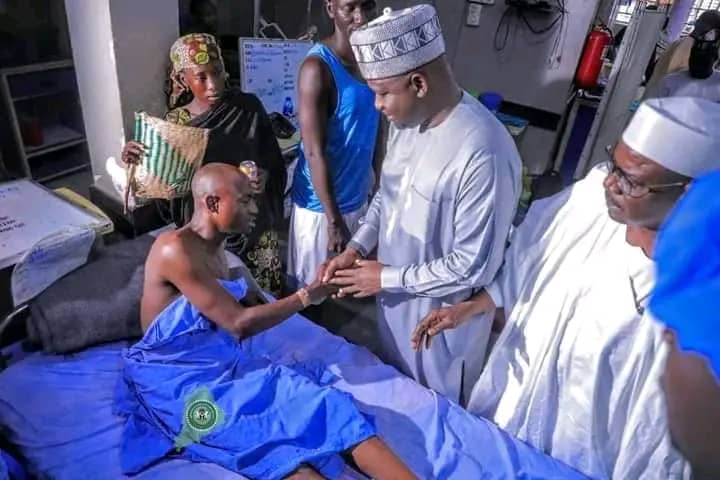Vice-president Kashim Shettima visits survivors in hospital, offers assurances of government support to victims and families affected by the tragedy and vows to bring perpetrators to justice.
The death toll from Saturday’s multiple suicide bombings in Gwoza town has risen to 32.
Eighteen people, including children, adults and pregnant women, died instantly in three separate but coordinated suicide bombings in the town in Nigeria’s northeastern Borno State.
Female suicide bombers, thought to be members of the Jamā’at Ahl as-Sunnah lid-Da’way Wa’l-Jihād (JAS), more commonly referred to as Boko Haram, carried out the attacks, targeting a wedding, a hospital and a funeral gathering.
More than 100 people were wounded. Many were transferred from the General Hospital in Gwoza to the State Specialist Hospital in Maiduguri, the capital of Borno State, for urgent treatment.
Gwoza town is close to Nigeria’s border with Cameroon and is about 135km from Maiduguri.
Nigeria’s Vice-President Kashim Shettima visited the wounded survivors on Monday evening and called on medical practitioners at the State Specialist Hospital to “intensify efforts”.
Shortly afterwards, he told reporters that several of the wounded had succumbed to their injuries while undergoing treatment, bringing the total death count to 32.
He said 14 people had been discharged while 26 were still receiving attention.
He condemned the brutal bombings and extended his condolences to the wounded and to the families of those who had lost loved ones.
He said: “It was a very pathetic scene. Our hearts go out to the victims.”
Shettima conveyed President Bola Tinubu’s sympathy to the people and the state government.
“The heart of President Bola Tinubu is with the victims and he specifically instructed us to come and offer our condolences and commiserations to the victims of this incident.”
Emphasising the government’s commitment to protecting its citizens, Shettima vowed to bring those “responsible for this horrific act” to justice. He offered assurances of government support for all victims and the families affected by this tragedy.
Shettima was accompanied by Borno State’s deputy governor, Umar Usman Kadafur, who is acting governor while Babagana Umara Zulum is on leave for a month.
Senator Ali Ndume, who represents southern Borno and is a native of Gwoza, Abubakar Kyari, the Minister of Agriculture and Food Security, Senator Sa’idu Ahmed Alkali, Baba Ahmad Jidda and Zubaida Umar were among high-ranking officials who visited the wounded.
Relatives told RNI reporter Falmata Mohammed Ali that they were “still in a state of shock”.
Aishatu Usman, the mother of one of the patients, said: “My son’s condition is critical and he has not spoken since the incident. We cannot complain; it was destined by the Almighty.”
“My husband and I were admitted on Saturday after the explosion. The government sent ambulances to transport the victims from Gwoza town to Maiduguri. I was treated and discharged. My husband’s condition was critical when we got here, but he has improved and will make a full recovery,” said Zainab Usman.
Habiba Musa expressed frustration with the hospital’s response, saying: “We were told to come back because there were not enough beds. Some hospital workers were rude to us despite our condition. Some patients received financial support but we did not get anything. We are angry about the way we have been treated. It has made us sad. We are still in a state of shock.”
Hadiza Hamman said: “I am visiting my granddaughter, who sustained a fracture in one of the blasts. We don’t know how many people lost their lives. It was chaotic and everyone was panicking.
“There are many victims and there are not enough health practitioners attending to them. It has made entire process very slow.
“When we were brought here two days ago, we knew of 18 people who died in the blasts. Now many more people have died. The number is increasing daily. Health workers need to fast-track the process to save our loved ones.”
The first blast on Saturday occurred at about 3pm in the middle of a wedding ceremony.
The female suicide bomber was described as a young mother in her twenties. She was carrying a baby and pretending to be a wedding guest when she detonated the improvised explosive device (IED) she was wearing. She and her baby and a number of guests died instantly. Many more were wounded. Injuries ranged from abdominal ruptures to skull and limb fractures.
The second blast occurred at the Gwoza General Hospital where the wounded from the first explosion were being treated.
A female suicide bomber, disguised as a mourner, detonated the third person-borne IED at a funeral gathering being held to bury the victims of the first explosion.
No one has claimed responsibility for the attacks, but authorities suspect the female suicide bombers were members of the JAS.
Tinubu condemned the attacks, describing them as “desperate acts of terror”.
He said his government would not allow the nation “to slither into an era of fear, tears, sorrow and blood”.
He vowed “to end terrorism across the country” and to bring those responsible to justice.
The United States condemned the attacks, saying: “These reprehensible acts of violence show a cruel and heartless disregard for human life … these abhorrent attacks are a stark reminder of the ongoing threat posed by terrorism in the region.”
Mohamed Mallick Fall, the United Nations Resident Coordinator in Nigeria, said: “I am horrified by this attack on civilian populations and condemn such acts in the strongest terms.”
Amnesty International Nigeria called for an end to assaults on civilians in Borno State.
“These deplorable attacks that took place at a time people were mourning demonstrate complete disregard for human life.”
AYSHA MUSTPHA KOLOMI








